Governance und Finanzierung
Diese Forschungsgruppe untersucht traditionelle und moderne Ansichten über Corporate Governance auf den Finanzmärkten. Sie trägt dazu bei, die Wirksamkeit verschiedener Governance-Mechanismen bei der Auswahl von Talenten, der Schaffung von Anreizen und der Bindung an das Unternehmen zu verstehen. Die Gruppe untersucht auch, wie verschiedene Stakeholder die Corporate Governance beeinflussen.
Forschungscluster
Finanzresilienz und RegulierungIhr Kontakt

- Abteilung Finanzmärkte
Referierte Publikationen
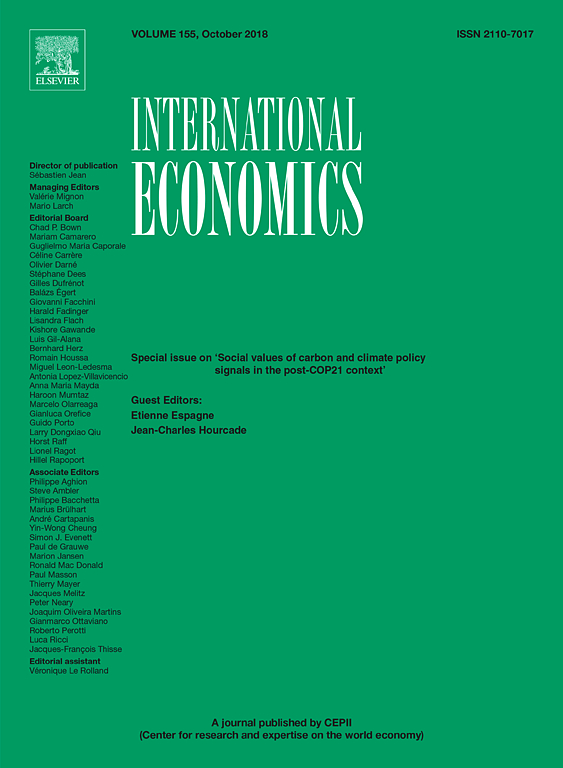
Non-linearity in the Finance-Growth Nexus: Evidence from Indonesia
in: International Economics, August 2017
Abstract
This paper investigates the finance-growth nexus where bank credit is decomposed into investment, consumption, and working capital credit. From a panel dataset of provinces in Indonesia, it documents that higher financial development measured by financial deepening and financial intermediation exhibits an inverted U-shaped relationship with economic growth. This non-linear effect of financial deepening is driven by both investment credit and consumption credit. These results suggest that too much investment credit and, to a lesser extent, consumption credit are detrimental to economic growth. Ultimately, only financial intermediation associated with working capital credit has a positive and monotonic impact on economic growth.

Social Capital and Debt Contracting: Evidence from Bank Loans and Public Bonds
in: Journal of Financial and Quantitative Analysis, Nr. 3, 2017
Publikation lesen
Does Social Capital Matter in Corporate Decisions? Evidence from Corporate Tax Avoidance
in: Journal of Accounting Research, Nr. 3, 2017
Abstract
We investigate whether the levels of social capital in U.S. counties, as captured by strength of civic norms and density of social networks in the counties, are systematically related to tax avoidance activities of corporations with headquarters located in the counties. We find strong negative associations between social capital and corporate tax avoidance, as captured by effective tax rates and book-tax differences. These results are incremental to the effects of local religiosity and firm culture toward socially irresponsible activities. They are robust to using organ donation as an alternative social capital proxy and fixed effect regressions. They extend to aggressive tax avoidance practices. Additionally, we provide corroborating evidence using firms with headquarters relocation that changes the exposure to social capital. We conclude that social capital surrounding corporate headquarters provides environmental influences constraining corporate tax avoidance.
Arbeitspapiere
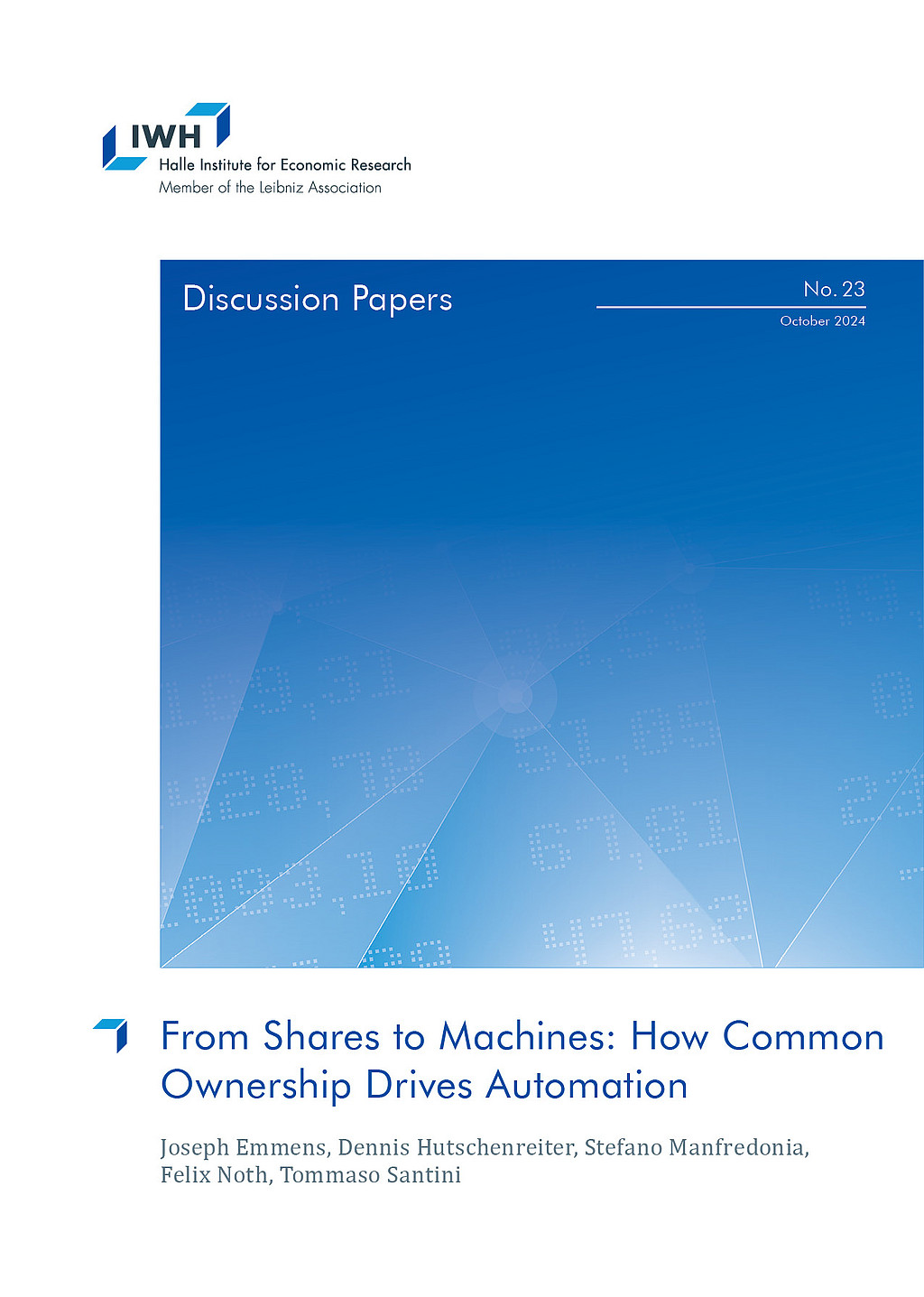
From Shares to Machines: How Common Ownership Drives Automation
in: IWH Discussion Papers, Nr. 23, 2024
Abstract
<p>Does increasing common ownership influence firms’ automation strategies? We develop and empirically test a theory indicating that institutional investors’ common ownership drives firms that employ workers in the same local labor markets to boost automation-related innovation. First, we present a model integrating task-based production and common ownership, demonstrating that greater ownership overlap drives firms to internalize the impact of their automation decisions on the wage bills of local labor market competitors, leading to more automation and reduced employment. Second, we empirically validate the model’s predictions. Based on patent texts, the geographic distribution of firms’ labor forces at the establishment level, and exogenous increases in common ownership due to institutional investor mergers, we analyze the effects of rising common ownership on automation innovation within and across labor markets. Our findings reveal that firms experiencing a positive shock to common ownership with labor market rivals exhibit increased automation and decreased employment growth. Conversely, similar ownership shocks do not affect automation innovation if firms do not share local labor markets.</p>
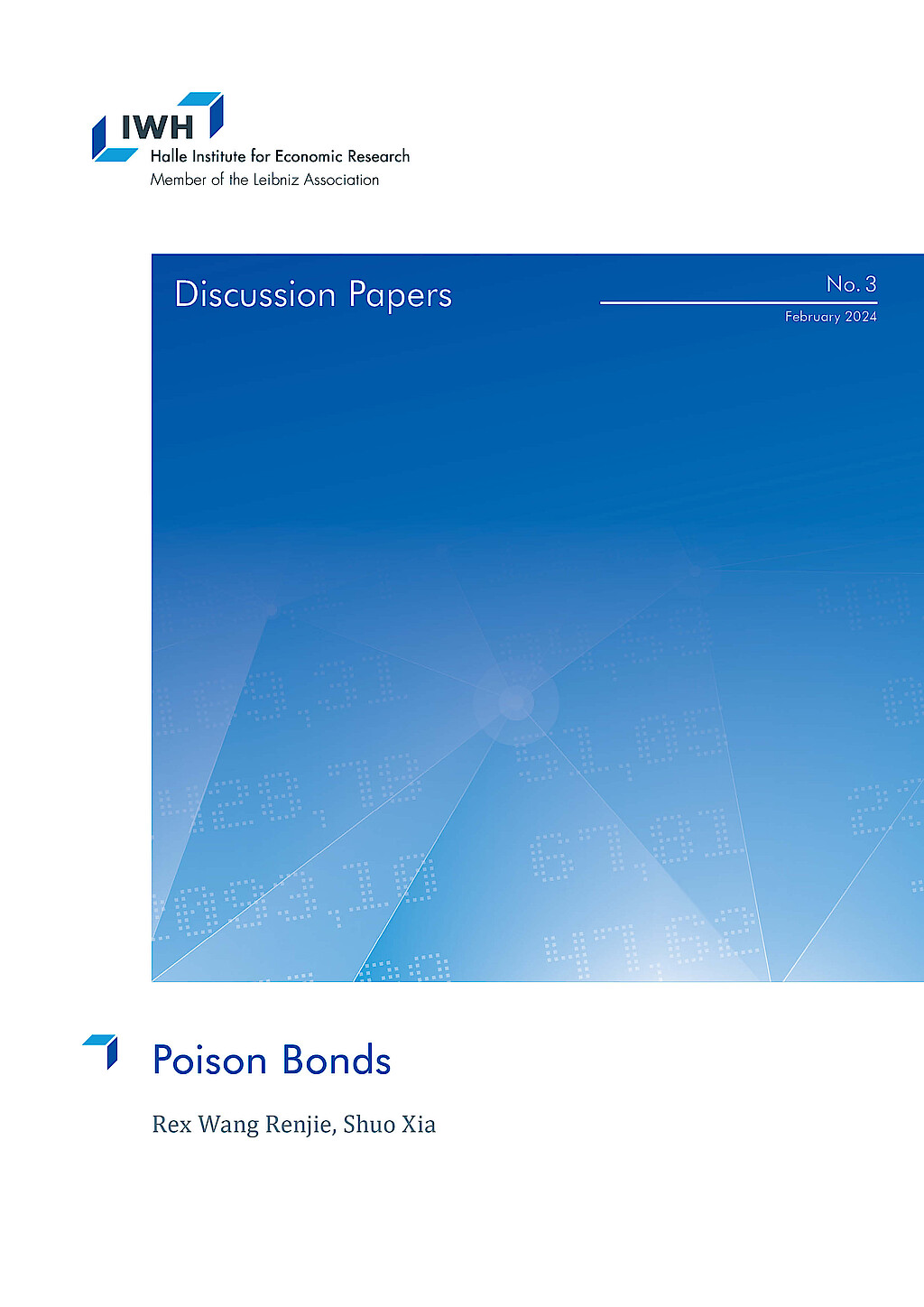
Poison Bonds
in: IWH Discussion Papers, Nr. 3, 2024
Abstract
This paper documents the rise of “poison bonds”, which are corporate bonds that allow bondholders to demand immediate repayment in a change-of-control event. The share of poison bonds among new issues has grown substantially in recent years, from below 20% in the 90s to over 60% since mid-2000s. This increase is predominantly driven by investment-grade issues. We provide causal evidence that the pressure to eliminate poison pills has led firms to issue poison bonds as an alternative. Our analysis suggests that this practice entrenches incumbent managers and destroys shareholder value. Holding a portfolio of firms that remove poison pills but promptly issue poison bonds results in negative abnormal returns of −7.3% per year. Our findings have important implications for the agency theory of debt: (i) more debt may not discipline the management; and (ii) even without financial distress, managerial entrenchment can lead to agency conflicts between shareholders and creditors.
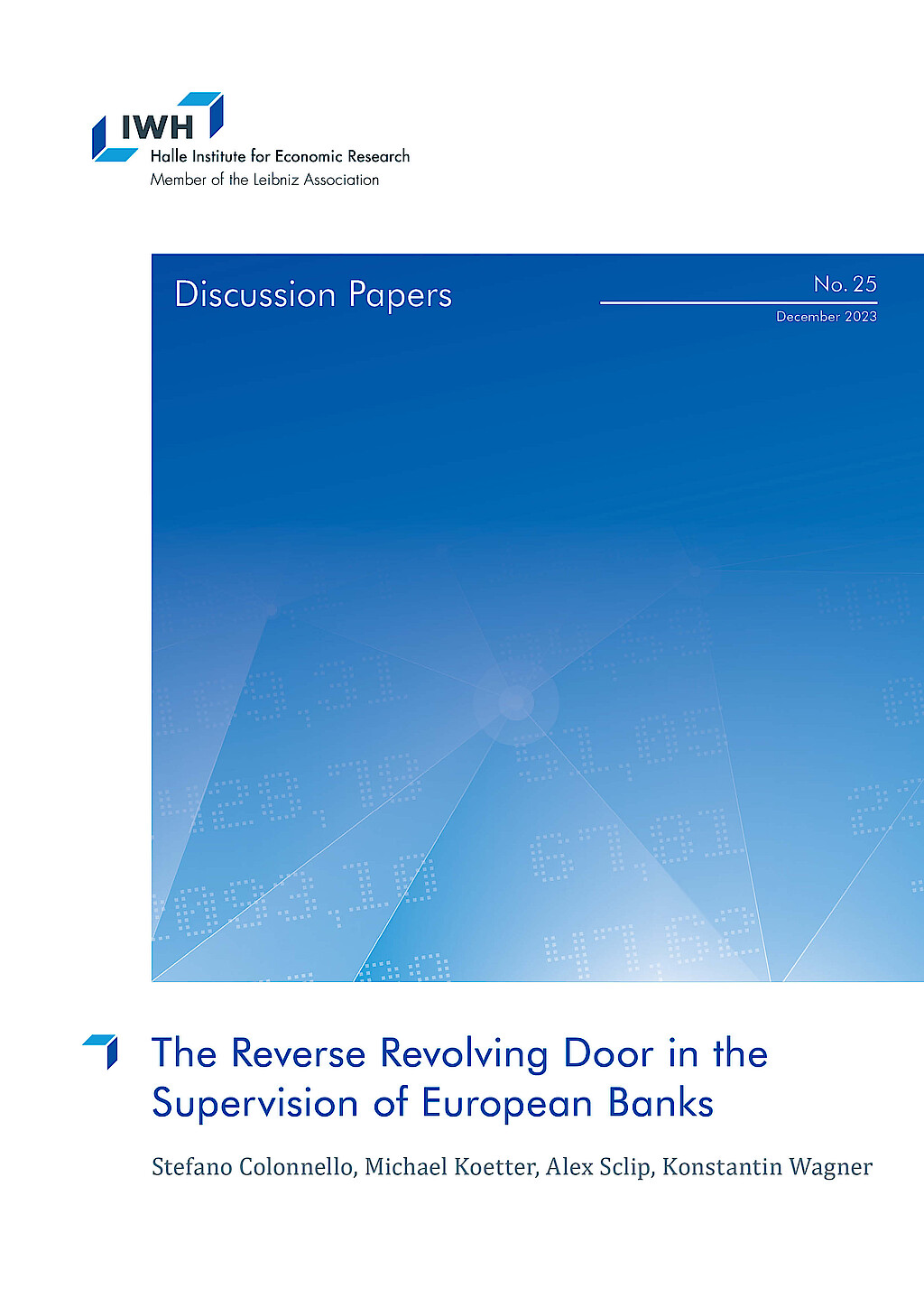
The Reverse Revolving Door in the Supervision of European Banks
in: IWH Discussion Papers, Nr. 25, 2023
Abstract
We show that around one third of executive directors on the boards of national supervisory authorities (NSA) in European banking have an employment history in the financial industry. The appointment of executives without a finance background associates with negative valuation effects. Appointments of former bankers, in turn, spark positive stock market reactions. This „proximity premium“ of supervised banks is a more likely driver of positive valuation effects than superior financial expertise or intrinsic skills of former executives from the financial industry. Prior to the inception of the European Single Supervisory Mechanism, the presence of former financial industry executives on the board of NSA associates with lower regulatory capital and faster growth of banks, pointing to a more lenient supervisory style.

Poison Bonds
in: SSRN Discussion Paper, 2023
Abstract
This paper documents the rise of "poison bonds", which are corporate bonds that allow bondholders to demand immediate repayment in a change-of-control event. The share of poison bonds among new issues has grown substantially in recent years, from below 20% in the 90s to over 60% after 2005. This increase is predominantly driven by investment-grade issues. We provide causal evidence that the pressure to eliminate poison pills has led firms to issue poison bonds as an alternative. Further analyses suggest that this practice entrenches incumbent managers, coincidentally benefits bondholders, but destroys shareholder value. Holding a portfolio of firms that remove poison pills but promptly issue poison bonds results in negative abnormal returns of -7.3% per year. Our findings have important implications for understanding the agency benefits and costs of debt: (1) more debt does not necessarily discipline the management; and (2) even without financial distress, managerial entrenchment can lead to conflicts between shareholders and creditors.
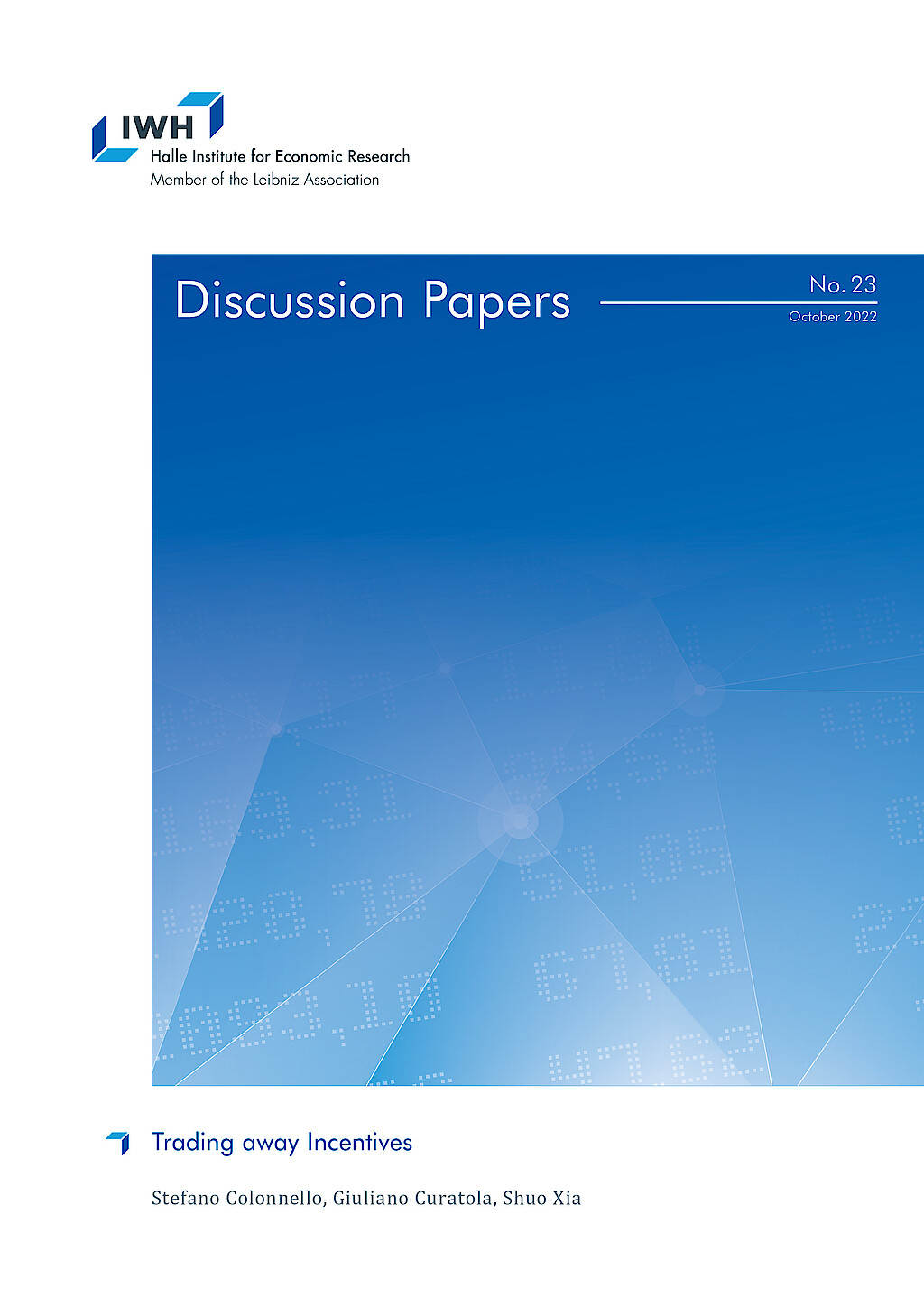
Trading away Incentives
in: IWH Discussion Papers, Nr. 23, 2022
Abstract
Equity pay has been the primary component of managerial compensation packages at US public firms since the early 1990s. Using a comprehensive sample of top executives from 1992-2020, we estimate to what extent they trade firm equity held in their portfolios to neutralize increments in ownership due to annual equity pay. Executives accommodate ownership increases linked to options awards. Conversely, increases in stock holdings linked to option exercises and restricted stock grants are largely neutralized through comparable sales of unrestricted shares. Variation in stock trading responses across executives hardly appears to respond to diversification motives. From a theoretical standpoint, these results challenge (i) the common, generally implicit assumption that managers cannot undo their incentive packages, (ii) the standard modeling practice of treating different equity pay items homogeneously, and (iii) the often taken for granted crucial role of diversification motives in managers’ portfolio choices.









